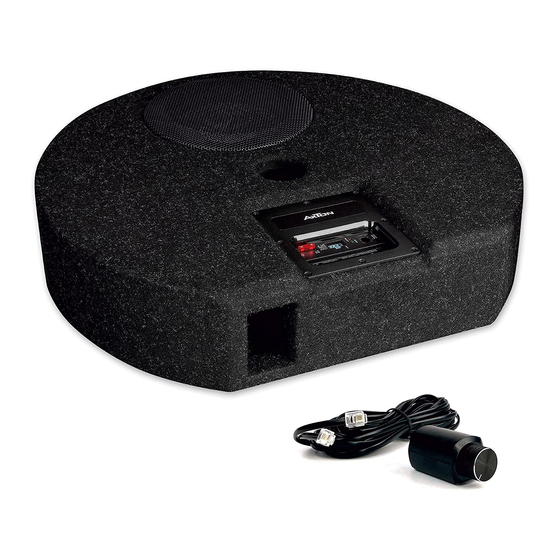AXTON ATB20RXF Manuel d'installation et d'utilisation - Page 3
Parcourez en ligne ou téléchargez le pdf Manuel d'installation et d'utilisation pour {nom_de_la_catégorie} AXTON ATB20RXF. AXTON ATB20RXF 13 pages. Active subwoofer

SAFETY INSTRUCTIONS
1. This unit is designed to be used in a vehicle with a 12V battery and negative ground.
2. Before any wiring, always remove the negative terminal of the battery to prevent short-
circuiting. This is also the last lead to be (re-)connected.
3. Do not disassemble or alter the unit in any way, because that will void your warranty. Do
not attempt to repair or to service the unit yourself, but contact an authorized AXTON
dealer instead.
4. Use only original accessories which are designed and manufactured for the unit,
otherwise you will risk damage. Install the unit according to the mounting manual and
use only the supplied mounting accessories. The forces of acceleration for accidents are
sometimes huge. Heavy objects may pose a risk for the driver and the passengers of the
car, during an accident.
5. Protect the unit from water and other liquids, which can enter the casing. A short circuit
or even fire could be the result.
6. Before you replace a defective fuse, try to find the cause for the short circuit. Please
pay attention to the cables of the power supply! If the short circuit doesn't result from a
failure of the power supply or wiring, you can replace the defective fuse with a new one
of identical value. If the short-circuit still exists, please contact an authorized AXTON
dealer.
7. Be careful not to drain the car battery while using the unit when the car engine is turned
off. Because the unit uses a considerable amount of energy and the battery will be
charged only while the engine is running, it might happen that the battery will discharge
to a point where it's not longer possible to start the engine.
8. If your car is parked in direct sunlight and there is a considerable rise in temperature
inside the car, allow the unit to cool off before operation.
9. The amplifier module employs a protection circuit to protect the transistors and the
woofer if the amplifier malfunctions. The amplifier's protection circuitry will shut-off the
amplifier in case of short-circuit, overload or DC offset at the speaker outputs or in case
of overheat. In case the cause for protection shut-off has been eliminated, the amplifier
will operate normally again (green LED ON/ Red LED OFF). Otherwise the amplifier will
continue to remain in protection mode.
10. Do not use the unit with a weak or old battery as its optimum performance depends on
a normal battery supply voltage.
11. Please pay attention to the music playback volume inside your vehicle, because you are
obliged to notice exterior sounds like a police siren or you might face penalties in case
of an accident or even loose your insurance cover.
12. Do not operate the unit in no other way than described in this manual. Failure to follow
the instructions within this manual will void your warranty.
– 4 –
WIRING & INTERFERENCE
All advice on wiring, controls and adjustments is based on the assumption that
n
you are thouroughly acquainted with all the requirements and features of the entire
audio equipment – especially the head-unit – connected to this powered subwoofer!
All cables are sources of interference. The power cable and RCA audio cable are very
prone to interference; the remote cable far less. There is often interference caused by the
alternator (buzzing or whining), ignition (crackling) or other car electronics parts. Most of
these problems can be eliminated by correct and careful wire routing. In doing so, read the
following guidelines first:
Use only a double-shielded RCA interconnects for the wiring between RCA input of the
n
amplifier and line-outs of the head unit.
Lay the signal and power cables separately with enough distance from one another and
n
also from each other wire harness in the car. The REM cable to the automatic amp remote
output of the radio can be laid together with the signal cables. Avoid ground loops by laying
the ground wiring of all components to a center point in a star-like way.
You can find the best central point in measuring the voltage directly at the battery. Now
n
compare this voltage value with the chosen ground point and the (+) terminal of the
amplifier. lf the measured voltage offers less than 0.1 V difference you've found the correct
central, which should be clean and uncorroded. Otherwise you have to look for another
point. You should measure with the ignition being switched on and additionally switched
on other electronics (rear window heating and lights). If there is noise pickup from external
electrical sources, try to route the RCA interconnect with a different path to the active sub.
– 5 –
